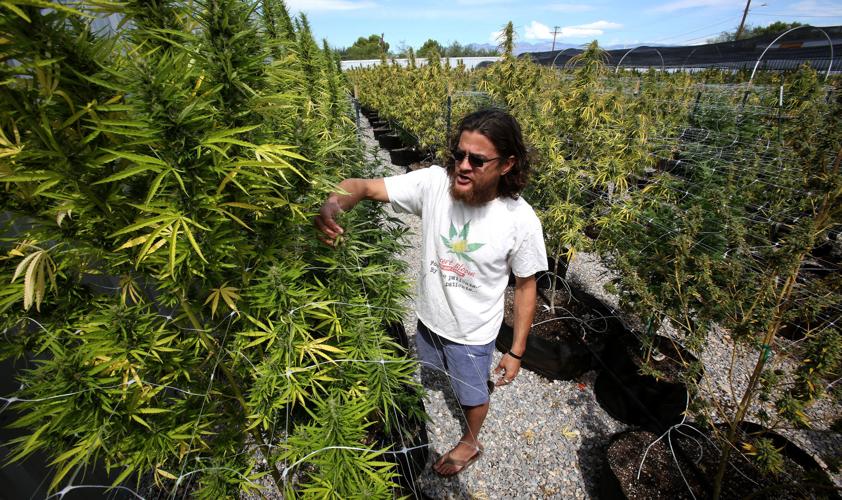Walk into this marijuana grow operation on Tucson’s south side, and the first thing you get is not so much a glimpse of the future.
It’s the smell of the future we may choose.
If you’ve ever tasted or smelled India Pale Ale, you can imagine it — it’s like the most pungent, hoppy beer you’ve ever smelled. Times two. This remodeled warehouse near the rodeo grounds is where Aari Ruben’s Desert Bloom dispensary grows and produces its marijuana products. It’s the first outdoor grow operation in an Arizona metro area, he said.
Inside, where employees are trimming buds and cooking up resin products, the herby odor is strong. Outside, where the first harvest is happening now, you don’t smell much, but you see our possible future: About three-quarters of an acre of cannabis, each plant in its own cloth planter.
The 2,000 plants will produce about 1,000 pounds, Ruben said. And if we pass Prop. 205, the initiative to legalize marijuana, the potential for existing dispensary owners like him is much greater.
“We stand to be very busy and have a large demand for our products,” he said. “If it fails, he said, we turn the gas off on the development. If it passes, we’ll look for property near here.”
This is a part of the future we’re pondering as we consider our votes on Prop. 205, the initiative that would allow anyone over age 21 to buy marijuana for whatever reason. There could be grow operations in cities, and there may well be bigger grows along I-10 between Tucson and Phoenix. Additional marijuana stores wherever cities will allow them.
It sounds ominous, but the atmosphere at this grow location is casual. At least a dozen employees were working inside and outside, harvesting buds, trimming them, separating out useless leaves, leaves with resin, and the main product.
Mario Moraga, who was cutting branches off the plants outside, was a bit amazed at the job he’d come into.
“I grew up right here on the south side,” he said. “I never thought I’d be doing this.”
Ruben said between the dispensary, 8060 E. 22nd Street, and this cultivation site, the business employs almost 50 people, most of them full time. The starting wage, he said, is $12 an hour.
As my colleague, Fred Araiza, took photos and I asked questions, none of the employees were bashful or afraid to be named. The idea that this business is normal and nothing to hide seems to have permeated the workplace.
In fact, even the main opponent of legalizing marijuana is not emphasizing arguments about the health effects of marijuana, the dangers to children, or that sort of thing. Those arguments are legitimate, I think, but Adam Deguire, campaign manager for the anti-205 effort, pointed to flaws in the text of the initiative as the main reason to vote against it.
One is that the initiative would ban using THC metabolites in your blood as the only reason to charge someone with a DUI. This would make it harder on police to charge people with DUI for driving after consuming cannabis products. Since there is not a reliable way to detect how recently a person used marijuana from a blood test, there is reason for this.
Also, Deguire noted, cities and counties can’t opt out of having marijuana dispensaries, as they can in Colorado under its legalization scheme. Indeed, I read the entire initiative for the first time this week, and can confirm that it would grandfather in all existing dispensaries. Cities could, however, prohibit additional ones.
This leads to the broadest complaint about this initiative’s wording — that it so clearly benefits the existing dispensary owners to the detriment of others who might want to enter the business. Not only will they escape any attempts by cities and counties to ban them, but they also are given priority for licenses until September 2021.
And if voters pass the initiative but the state fails to implements it, the existing dispensaries may sell to anyone 21 or over on Sept. 1, 2018.
“It’s crony capitalism at its finest,” Deguire said. “Very clearly it will give a leg up to those already in the medical marijuana industry.”
It would, and that’s one of the reasons I’m still puzzling over the initiative myself, even though I’m conceptually a supporter of legalization.
Ruben acknowledged that the initiative “is certainly heavily in favor of the current operators.”
“It’s not fair to the other people who would like to be in the industry necessarily,” he went on. “But those hundred or so organizations stuck their necks out at a time when laws were uncertain and made investments that were risky.”
All you had to do was look around at this cultivation operation to get this point. Ten-foot walls surround the place, as required. There are special vacuum ovens to create cannabis concentrates. Grow lamps inside. Massive air conditioners and dehumidifiers.
The existing growers and sellers deserve some consideration. But then again, they’re already doing quite well. Ruben put the business’ revenues at about $7.5 million between the growing and retail operations.
And our existing medical marijuana scheme doesn’t put many obstacles in the way of people who might want to use cannabis for recreational reasons. When I yawned during the tour Tuesday and mentioned a sleepless night, Ruben asked if I had my medical marijuana card yet, then recommended a doctor who could help me get one.
Functionally, we’ve got recreational marijuana already. It’s a matter of whether we want to confirm that in law and expand businesses like this bustling grow operation in the heart of the city.





